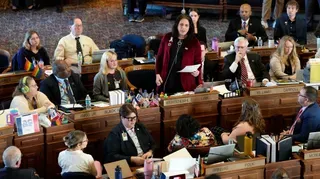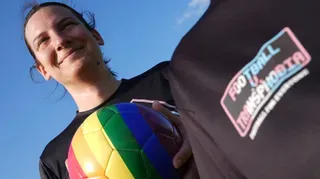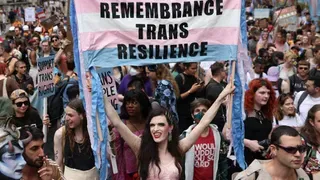February 1, 2014
Lesbian Leaders: Sexism A Bigger Problem
Kilian Melloy READ TIME: 5 MIN.
Three of Santa Clara County's leading lesbians said at a recent forum that sexism threatened to hold them back more than homophobia as they moved up the ladder in their respective careers.
Panelists Kathy Levinson, Amy Brown, and Laura Garnette spoke candidly about how they blazed the path for the next generation as they moved through their careers.
About 50 people, many of them LGBT women in their 20s and 30s, turned out for the panel, "Through the Thick Glass Ceiling: A Conversation with Lesbian Women Leaders of Silicon Valley," that kicked off the Bay Area Municipal Elections Committee Foundation's speaker series January 23 in San Jose.
Levinson is the managing director of Golden Seeds, an investment firm that focuses on empowering women and entrepreneurs. She spent much of her career in the financial services sector working for Charles Schwab and E-Trade, where she rose to chief operating officer.
Brown is the director of agriculture and environmental management for Santa Clara County and has had a successful career in municipal government, including a stint as the acting city administrator for San Francisco.
Garnette is deputy chief of the probation office in Santa Clara County and has led a successful career in the justice system.
Path to Success
What helped these women move past sexism and homophobia was picking their battles wisely and striking when they knew they could make an impact, they said. At the same time they said they were honest about who they are and willing to educate others.
"Even though I was out, I was not out enough," said Levinson about the confusion her pregnancy caused among her colleagues and managers early in her career. Rumors flew around the office that the man at the helm of the company impregnated her because she rapidly progressed up the professional ladder. The flipside was company heads didn't think that as a lesbian she would go down the mommy track, she said.
She realized that every moment was a teachable one.
"I realized I needed to be my best ally," said Levinson. "The way to be my best ally was to use every opportunity to educate and that every single moment ... is a teachable moment and it never comes again. It's for better or for worse, but it's not neutral."
Sexism struck again for Levinson when she discovered that she was being paid 30 percent less than her male counterparts. Rather than demand equal pay, she chose to make herself invaluable to the company. The plan worked. Before long she proved her worth and was compensated equivalent to her male peers.
"It's really important to be strategic and thoughtful when making these changes," said Levinson about making the workplace better for LGBTs and women.
LGBT employee resource groups proved to help Brown when she entered the workforce and found her place in her career, she said.
Public figures played an important role in inspiring and influencing Garnette in her life and career. Out since she was 15 years old the 50-year-old said openly gay politicians such as Santa Clara County Supervisor Ken Yeager and former Santa Cruz Mayor John Laird inspired her to be 100 percent honest about who she is, she said.
"Those kinds of people changed my life," because they didn't seem foreign, but normal as public figures, said Garnette.
Levinson agreed that being a role model was the most important contribution that she and others in similar positions could make, not only for young LGBT professionals, but also her own daughters, she said.
All of the women agreed that being comfortable in your own skin and honest about who you are is one of the keys to success and ultimately and changing hearts and minds.
Garnette's advice to young LGBT professionals is to unapologetically be themselves, she told the audience.
The discussion, which was moderated by Santa Clara County Supervisor Cindy Chavez, a straight ally, was a success. Women swarmed around the speakers, talking with them for more than a half hour after the panel ended.
"The panelists were excellent," said BAYMEC president James Gonzales, "This is a conversation that the community has been longing to have."
Amber Cameron, a strategic operations and initiatives manager of public safety for the city of Palo Alto, found the women inspiring.
"What was most interesting to me was how sexism was more of a problem for them and in their career growth," said Cameron, a 30-year-old lesbian.
She was somewhat surprised about the role sexism played in the speakers' careers, thinking for a moment about her own encounters with sexism.
"I've experienced that too. I've encountered more sexism than I have homophobia ... I find that disappointing," Cameron said.
To overcome her disappointment, Cameron found inspiration in what each woman on the panel said.
"Each one of them reaffirmed the best thing to do is to be myself," said Cameron. "I really loved what Laura said is to be unapologetic about it and being okay with having a dialogue and educating people."
The panelists proved one thing to Wiggsy Sivertsen, 78, who co-founded BAYMEC and is a board member.
"If you persevere, things change and I think that they are an example of a lot of change that has occurred and made the world a different place for young people," she said.
Community Building
The community's response to the speakers was exactly what BAYMEC organizers hoped for as the nearly 30-year-old political action committee's entry into a new aspect of community service with its foundation.
The foundation, established late last year, is currently in the process of obtaining its nonprofit status. It aims to offer more services to Santa Clara County's LGBT community, said Sivertsen and Yeager.
"This was a great launch," said Yeager after the panel discussion. "It gives people an idea the kind of programs and events the foundation would put on."
Yeager, who thought of putting some of the county's leading lesbians in the forefront of the new foundation's speaker series, hopes the community will want more by supporting the organization as it grows.
"There's really a lot of work to be done," said Yeager, who didn't go into detail when the Bay Area Reporter asked. "BAYMEC just really hasn't had the volunteer base to do that. I think with the foundation it will be able to do more of that work."
Right now the foundation's main goal is to connect the community, particularly young emerging leaders.
"We need to do more of these types of events where people can meet more successful and very prominent gays and lesbians," said Yeager, pointing out that many people don't know that LGBTs are in plain sight leading the South Bay's government, community organizations, and corporations.
Kilian Melloy serves as EDGE Media Network's Associate Arts Editor and Staff Contributor. His professional memberships include the National Lesbian & Gay Journalists Association, the Boston Online Film Critics Association, The Gay and Lesbian Entertainment Critics Association, and the Boston Theater Critics Association's Elliot Norton Awards Committee.







